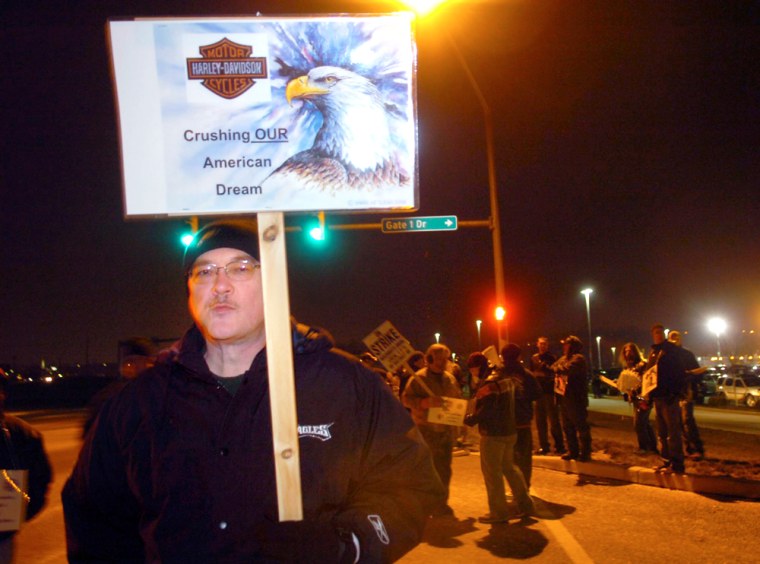Nearly 2,800 union workers walked off the job Friday at Harley-Davidson Inc.’s largest manufacturing plant, with small groups quietly picketing each entrance of the York facility.
The workers said they were prepared to stay on the picket lines for as long as it took to win a better contract than a company proposal they overwhelmingly rejected two days ago.
“There’s no sense in doing this if we’re not going to stick together,” said Nevin Bechtel, 59, who works in the plant’s painting department. “If we regress now, we’ve lost everything we’re struggling for, and the company will think they’ve won.”
More than 50 workers gathered as the strike began at midnight, said Tom Boger, a union representative for the International Association of Machinists and Aerospace Workers Local 175. Fifty members at a time were scheduled to picket throughout the day in three-hour shifts.
The company installed cement barricades to block access to all gates, even empty parking lots, Boger said.
The union voted Wednesday to authorize a strike after rejecting the company’s contract offer, which would have reduced pay rates for new hires, required employees to pay part of their health insurance premiums and forced pension concessions.
In anticipation of the walkout, the company shut down production at the plant on Thursday.
“We are obviously disappointed by the union’s decision,” Fred Gates, general manager of Harley-Davidson’s York operations, said Thursday. “The proposed contract was structured to help manage future costs that could be detrimental to our business over the long term.”
But union members said they felt management’s proposal would be a backward step.
“If they had kept the contract the way it is, everyone would have been fine with it,” said Lucey Mrozinski, 43, a welding machine operator on the picket line.
Bechtel said the proposed two-tier wage system would hurt morale.
“We’ll still keep building first-rate bikes, but when the second-rate people take over, what are we going to build then? Second-rate bikes,” he said.
Russell Aldinger, 46, a mechanical assembler who said he had worked at the plant for 10 years, said he thought the company could afford to make a better offer.
“This company is very profitable, and for us to have to take concessions when we were earning the money that we were ... I feel it’s ridiculous,” he said.
The company said its proposal included annual wage increases of 4 percent over three years. But part of the increase depended on the union’s agreeing to contribute toward health insurance coverage. Unionized employees currently pay no premium. It also would have doubled the company’s 401(k) retirement plan contributions.
Boger said the union was prepared to return to negotiations.
“We’ll wait for the company to call us,” he said.
The facility employs more than 3,200 union and nonunion workers.
